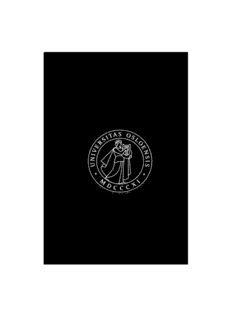Table Of ContentThe EU – a normative actor?
A study of the EU’s foreign policy towards
China (2005 to 2009)
Sandra Molin Bruce
Master Thesis
Department of Political Science
Faculty of Social Science
UNIVERSITY OF OSLO
June 2011
II
III
The EU – a normative actor?
A study of the EU’s foreign policy towards China
(2005 to 2009)
IV
© Sandra Molin Bruce
2012
The EU – a normative actor?
Sandra Molin Bruce
http://www.duo.uio.no/
Print: Reprosentralen, University of Oslo
V
Abstract
In this thesis I have analysed policy discourses and policy practices of the EU towards China
in the period of 2005-2009. I have examined to what extent the policy discourses and policy
practices were normative in character, and whether there was a consistency between
normative commitments and normative practices. Theories on the EU as a normative actor
were applied in the analysis.
Two main discourses were identified in the EU throughout the period. The first, the
‘partnership’ discourse, centred on interest-based goals. The latter, ‘norm concerning’
discourse, centred on normative goals. The non-normative ‘partnership’ discourses dominated
in the period, with the year 2008 as an exception. In 2008, norm concerns were widely and
strongly expressed within the EU.
The analysis of practices showed that when the ‘partnership’ discourses dominated, the policy
tools were applied mainly to promote interest-based goals. When the ‘norm concerning’
discourse dominated in 2008, the practice also changed, as the EU in this period increasingly
promoted norms, both in dialogues and through public statements and condemnations. Even
though the potential for norm promotion was larger in the practice, the EU was still close to
being a consistent normative actor.
In 2009 a change was again seen, when the ‘partnership’ discourse increasingly was
represented in EU, and the EU primarily focused on seeking economic goals in practice. The
economic and financial crisis in Europe was used to legitimise the promotion of a strong
economic beneficial partnership with China. In sum, there was a high degree of consistency
between the dominating discourse and the main practices. Yet the EU was mainly not a
normative actor, foremost seeking interest-based goals.
Word Count: 43 389
Main body: 38 394
VI
VII
Acknowledgements
First, I would like to thank my supervisor, Pernille Rieker, for constructive guidance and
clarifying discussions throughout the year.
I am thankful for the student grant from the Fritt Ord foundation, giving me the opportunity to
conduct interviews in Brussels. The Norwegian Mission to the EU provided useful
information, thank you. I would also express gratitude to the respondents, setting aside time to
meet me, and provide useful insights.
I am thankful for the encouragement from all my friends and family. I would especially like
to thank Nora Fjelddalen, Atle Haugsgjerd, Trine Østereng and Hanna Wernø for reading my
drafts and giving me valuable feedback. A special thanks to Hanna for necessary advice, and
motivation in the final period.
Above all, I thank Øyvind Bugge Solheim for his love, continuous support, admirable
patience and belief in me. Your encouragement made this possible.
Any faults or mistakes are solely my responsibility.
Sandra Molin Bruce
Oslo 11.06.12
VIII
IX
Table of Contents
List of Abbreviations ............................................................................................................... XII
1
Introduction .......................................................................................................................... 1
1.1
The EU – a normative actor towards China? ................................................................ 3
1.1.1
Research question and purpose of study ................................................................ 3
1.1.2
Specification of research design ............................................................................. 5
1.1.3
Definition of key concepts ..................................................................................... 7
1.2
Theoretical and methodological approach .................................................................. 11
1.2.1
A ‘soft’ constructivist approach ........................................................................... 11
1.2.2
Methodology ........................................................................................................ 12
1.2.3
Reflections on validity and reliability .................................................................. 17
1.3
The thesis in outline .................................................................................................... 18
2
Theoretical framework ....................................................................................................... 19
2.1
Normative Power Europe theory ................................................................................. 20
2.1.1
The EU’s normative principles ............................................................................ 21
2.1.2
The spread of norms ............................................................................................. 23
2.2
Tocci’s conceptualisation of a ‘normative foreign policy’ ......................................... 24
2.2.1
Normative goals ................................................................................................... 24
2.2.2
Normative means .................................................................................................. 25
2.3
Forsberg’s conceptualisation of a ‘normative power’ ................................................. 25
2.3.1
Normative interests .............................................................................................. 26
2.3.2
Normative means of power .................................................................................. 26
2.4
Assessing the normativity of discourse and practice .................................................. 28
2.4.1
A normative discourse .......................................................................................... 28
2.4.2
A normative practice ............................................................................................ 29
2.4.3
A normative foreign policy actor ......................................................................... 30
3
Building a strategic partnership (2005 and 2006) .............................................................. 31
3.1
Discourses: Pursuing a ‘strategic partnership’ overshadow normative concerns ....... 31
3.1.1
The ‘partnership’ discourse .................................................................................. 31
3.1.2
The ‘norm concerning’ discourse ......................................................................... 36
3.1.3
Normative discourse? ........................................................................................... 40
3.2
Practices: Engagement in dialogue rather than official pressure ................................ 44
X
Description:In this thesis I have analysed policy discourses and policy practices of the EU promoted norms, both in dialogues and through public statements and

